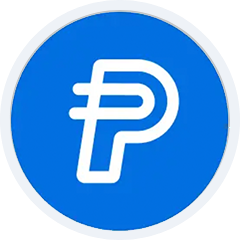
When choosing a crypto wallet, you should look for a solution that offers flexibility, functionality, and exceptional security. Here’s what you can do with your Zengo PayPal USD (PYUSD) wallet:
Here are just a few things you can do with your Zengo Ethereum Wallet:
With Zengo, you can easily keep an eye on the status of your PYUSD holdings as well as monitor market conditions. With accurate data at your fingertips, you’ll be able to make informed decisions with confidence.
Zengo simplifies the process of sending and receiving PYUSD. Transfer PYUSD between different wallets, exchanges, and even to friends and family with just a few taps. You’ll receive notifications when your PYUSD arrives, allowing you to begin trading right away.
Zengo provides its users with a secure platform for purchasing cryptocurrencies like Bitcoin, Ether, Tether, and many others. Our intuitive user interface makes it easy to buy crypto through our payment partners directly from the app.
With Zengo, users can purchase a vast array of cryptocurrencies using fiat currencies like Euros, US dollars, and pound sterling. While some tokens might not be available for direct purchase, Zengo offers the flexibility to trade them with nearly all major cryptocurrencies, which simplifies the process of investing in altcoins.
Zengo offers diverse payment options, including Visa, Mastercard, Apple Pay, SEPA, and Swift transfers (in certain countries). Click the “Buy” icon in the “Actions” tab of the Zengo app in order to browse available payment methods and providers.
Zengo provides a safe and secure environment for holding/HODLing PayPal USD stablecoins. With Zengo, your funds are completely secure, and you can access your digital investments anytime, even if your device is stolen or damaged.
Considering PYUSD as your next investment? Here’s what you need to understand about this stablecoin:
PYUSD, or PayPal USD, is a stablecoin introduced by PayPal, designed for payments and backed by secure, highly liquid assets.
PYUSD was launched by PayPal in August 2023. While initially exclusive to US residents within the PayPal app, its foundation on the Ethereum blockchain makes PYUSD accessible globally.
PayPal launched PYUSD to provide a stable medium for digital payments. As a stablecoin, PYUSD is backed by secure and highly liquid assets, ensuring consistent value. By integrating PYUSD into its platform, PayPal aims to enhance its cryptocurrency offerings, allowing users to transact, hold, and manage their digital assets seamlessly within their ecosystem.
PYUSD stands as a testament to PayPal’s expansion into the cryptocurrency realm. This move demonstrates PayPal’s commitment to innovation and its acknowledgment of the growing importance of digital assets in the financial sector.
PayPal claims that its PYUSD stablecoin maintains its constant $1 USD value by being fully backed and secured with assets. This includes not just dollar deposits but also US treasuries and cash equivalents. By maintaining such a diversified and strong reserve, PYUSD demonstrates its legitimacy as a reliable stablecoin in the crypto market.
Paxos Trust Company collaborates closely with PayPal in the PYUSD venture. While PayPal is the driving force behind the stablecoin, Paxos brings its blockchain expertise to the table. They are responsible for issuing PYUSD and managing its operations on the Ethereum blockchain. This partnership ensures that while PayPal provides the financial foundation, Paxos ensures the coin’s technical issuance and seamless blockchain integration. The collaboration showcases a blend of PayPal’s financial prowess with Paxos’ technical acumen in the cryptocurrency domain.
No, PYUSD is not a mineable cryptocurrency. It’s a stablecoin introduced by PayPal, and its supply is managed by the company. Unlike cryptocurrencies like Bitcoin, which rely on a decentralized network of miners to validate transactions and generate new coins, PYUSD is issued based on the backing of real-world assets, particularly the US dollar, ensuring its stability.
PYUSD runs on the Ethereum blockchain, utilizing its established infrastructure as an ERC-20 token. This allows for interoperability with various Ethereum-based applications and services.
PYUSD has applications both within the PayPal platform and in the broader crypto ecosystem. On PayPal, users can buy, sell, hold, conduct payments, and manage their transactions. Outside of PayPal, as an Ethereum-powered ERC 20 token, PYUSD stands out among other stablecoins due to the excellent reputation and trust associated with the PayPal brand.
While there are other notable stablecoins available on the market, such as USDC, USDT, and DAI, PYUSD stands apart due to its association with PayPal—one of the world’s most recognized and trusted financial giants. While USDC, USDT, and DAI have their own pros and cons, none of them are supported by a brand that is as globally recognized and trusted as PayPal. The creation of PYUSD by such an iconic institution not only signifies its stability but also assures users of the reliability they’ve come to expect from PayPal.

PayPal and Paxos Trust Company collaborated to launch the PYUSD token, combining PayPal’s financial capabilities with Paxos’ blockchain expertise.
PYUSD can be transferred between PayPal and compatible external wallets, such as Zengo.
PayPal USD (PYUSD) exists as an ERC-20 token on the Ethereum blockchain.
PayPal allows its users to make purchases and payments with PYUSD at checkout.
PayPal USD is fully backed by US dollar deposits, US treasuries, and cash equivalents.
PYUSD can be seen as PayPal’s response to the growing popularity of stablecoins in web3 and digital environments.
Prior to the introduction of PYUSD, PayPal supported cryptocurrencies, but they were limited in terms of features and who was able to use them.
The PYUSD stablecoin was designed to seamlessly connect fiat and digital currencies.
Many crypto enthusiasts hope that the launch of PYUSD will be remembered as a pivotal point in crypto adoption, given that millions of PayPal users are ready to benefit from its use.
Reserves for PYUSD are fully transparent, with Paxos publishing a public monthly Reserve Report.
Zengo is a one-stop-shop for all your cryptocurrency needs. The wallet has several unique features that make trading a breeze, whether you are highly experienced or a complete beginner.

With Zengo, you can access your crypto portfolio at any time. Buy, trade, view, or send Ethereum to friends and family on the go, whenever you need to. Unlike other wallets, there are no minimums, no maximums, and no expensive transaction fees. Just safe and simple transacting.
Zengo takes security to a whole new level. By making use of advanced MPC technology and biometric 3-factor authentication to protect your digital assets, Zengo ensures that only you can access your account. On top of that, Zengo offers a Web3 firewall which keeps you protected when you interact with Web3 Dapps via our WalletConnect integration.

At Zengo, we believe that users should have complete control over their digital assets. It is for this reason that Zengo was designed to operate as a fully non-custodial wallet, meaning you are the only one who can access your funds.

Zengo will be able to restore access to your wallet and your coins through its authentication methods. If you lose your device at any time, our helpful agents will help you recover access in no time.

At Zengo, we love automation and technology but not for our helpdesk. Find live support agents directly in the app, whenever you need them. We’re available 24/7. Zengo will help new crypto investors every step of the way.
Setting up a PYUSD wallet doesn’t require any kind of exceptional level of technical expertise on your part. You simply need to download the Zengo app from Apple App Store or Google Play and then follow the instructions on the screen to get started. After that, you will be able to purchase your first cryptocurrency and receive PYUSD either from someone else or from your PayPal account.
To store PayPal USD tokens, you will need a wallet that supports them. Zengo’s non-custodial wallet offers a secure storage solution for your PYUSD tokens. We use advanced MPC technology in order to protect your assets and ensure their safety. In addition, in the event that your phone gets misplaced or damaged, your wallet can be easily restored on a new mobile device using your biometric data.
A PYUSD wallet can be described as a digital application that stores your private keys. These private keys are crucial for accessing and interacting with your PYUSD on the blockchain. Each wallet has its unique address used to send or receive PYUSD. While the wallet doesn’t directly store tokens, it serves as proof of ownership for tokens linked to its address.
Setting up a PYUSD wallet with Zengo is a simple and straightforward process. To get started, download Zengo from Apple App Store or Google Play. Once your account has been created, proceed to the onboarding stage to ensure you can use biometrics to log in.
To access your PYUSD wallet address, tap on the “Actions” button, then hit on “Receive,” find the PYUSD ERC-20 token and then tap it to display its unique wallet address. This can be shared with people who want to send you tokens or pasted into your PayPal app in order to move your PYUSD to Zengo.
To get your PYUSD wallet address, you will need a crypto wallet that supports this currency, such as Zengo. You can download Zengo from the Apple App Store or Google Play. Once the app is set up and the onboarding process has been completed, tap on the “Actions” tab, then “Receive.” Select PYUSD from the list to display your unique PYUSD address. This address can be shared for receiving PYUSD from other users or wallets. There’s also an attached QR code to help facilitate easy transfers.
Yes, you can! With Zengo, you can transfer your PYUSD tokens directly to their PYUSD wallet address. If they don’t have one, they can set up Zengo and then share their new address with you. You can then send them any PYUSD amount you choose.
To set up and create your new PYUSD wallet account, simply start by installing Zengo. Then, follow the intuitive onboarding process, which includes steps like facial scanning, email verification, and cloud backup. Once you complete signing up, you will have access to your PYUSD wallet.
If you want to send PYUSD, you need the recipient’s PayPal USD address. To start, simply tap on the “Actions” tab found on the main menu and then on “Send.” Next, locate and tap on the PYUSD token. Input the destination address along with any other relevant information, and initiate the transfer.
To receive PYUSD, simply provide your PayPal USD wallet address to the sender. Zengo will notify you as soon as your tokens arrive. If you wish to find your PYUSD address, simply click on the “Actions” tab found on the main menu, then tap on “Receive,” and then pick PayPal USD (PYUSD) from the list. The long line of letters and numbers you are looking at is the address for your PayPal USD wallet.
Disclaimer: The information provided herein is for educational purposes only. Zengo does not provide any investment or financial advice whatsoever. As with any financial or investment decision, conduct your own research and due diligence to properly evaluate the benefits and risks of any investment or financial transaction and seek the advice and guidance of qualified financial professionals, in connection with any investment or financial transaction.
© 2024 Zengo Ltd. All rights reserved.